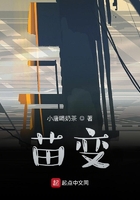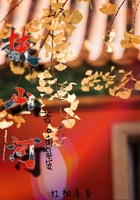At that moment, the mother who was crouching on the pavement, opened her eyes wide. Without uttering a cry, she raised herself erect with a terrible expression; then she flung herself upon the hand of the executioner, like a beast on its prey, and bit it.It was done like a flash of lightning.The headsman howled with pain.Those near by rushed up.With difficulty they withdrew his bleeding hand from the mother's teeth.She preserved a profound silence.They thrust her back with much brutality, and noticed that her head fell heavily on the pavement.They raised her, she fell back again.She was dead.
The executioner, who had not loosed his hold on the young girl, began to ascend the ladder once more.
Chapter2 The Beautiful Creature Clad in White.(Dante.)
When Quasimodo saw that the cell was empty, that the gypsy was no longer there, that while he had been defending her she had been abducted, he grasped his hair with both hands and stamped with surprise and pain; then he set out to run through the entire church seeking his Bohemian, howling strange cries to all the corners of the walls, strewing his red hair on the pavement. It was just at the moment when the king's archers were making their victorious entrance into Notre-Dame, also in search of the gypsy.Quasimodo, poor, deaf fellow, aided them in their fatal intentions, without suspecting it; he thought that the outcasts were the gypsy's enemies.He himself conducted Tristan l'Hermite to all possible hiding-places, opened to him the secret doors, the double bottoms of the altars, the rear sacristries.If the unfortunate girl had still been there, it would have been he himself who would have delivered her up.
When the fatigue of finding nothing had disheartened Tristan, who was not easily discouraged, Quasimodo continued the search alone. He made the tour of the church twenty times, length and breadth, up and down, ascending and descending, running, calling, sbouting, peeping, rummaging, ransacking, thrusting his head into every hole, pushing a torch under every vault, despairing, mad.A male who has lost his female is no more roaring nor more haggard.
At last when he was sure, perfectly sure that she was no longer there, that all was at an end, that she had been snatched from him, he slowly mounted the staircase to the towers, that staircase which he had ascended with so much eagerness and triumph on the day when he had saved her. He passed those same places once more with drooping head, voiceless, tearless, almost breathless.The church was again deserted, and had fallen back into its silence.The archers had quitted it to track the sorceress in the city.Quasimodo, left alone in that vast Notre-Dame, so besieged and tumultuous but a short time before, once more betook himself to the cell where the gypsy had slept for so many weeks under his guardianship.
As he approached it, he fancied that he might, perhaps, find her there. When, at the turn of the gallery which opens on the roof of the side aisles, he perceived the tiny cell with its little window and its little door crouching beneath a great flying buttress like a bird's nest under a branch, the poor man's heart failed him, and he leaned against a pillar to keep from falling.He imagined that she might have returned thither, that some good genius had, no doubt, brought her back, that this chamber was too tranquil, too safe, too charming for her not to be there, and he dared not take another step for fear of destroying his illusion.“Yes, ”he said to himself, “perchance she is sleeping, or praying.I must not disturb her.”
At length he summoned up courage, advanced on tiptoe, looked, entered. Empty.The cell was still empty.The unhappy deaf man walked slowly round it, lifted the bed and looked beneath it, as though she might be concealed between the pavement and the mattress, then he shook his head and remained stupefied.All at once, he crushed his torch under his foot, and, without uttering a word, without giving vent to a sigh, he flung himself at full speed, head foremost against the wall, and fell fainting on the floor.
When he recovered his senses, he threw himself on the bed and rolling about, he kissed frantically the place where the young girl had slept and which was still warm; he remained there for several moments as motionless as though he were about to expire; then he rose, dripping with perspiration, panting, mad, and began to beat his head against the wall with the frightful regularity of the clapper of his bells, and the resolution of a man determined to kill himself.At length he fell a second time, exhausted; he dragged himself on his knees outside the cell, and crouched down facing the door, in an attitude of astonishment.
He remained thus for more than an hour without making a movement, with his eye fixed on the deserted cell, more gloomy, and more pensive than a mother seated between an empty cradle and a full coffin. He uttered not a word; only at long intervals, a sob heaved his body violently, but it was a tearless sob, like summer lightning which makes no noise.
It appears to have been then, that, seeking at the bottom of his lonely thoughts for the unexpected abductor of the gypsy, he thought of the archdeacon. He remembered that Dom Claude alone possessed a key to the staircase leading to the cell; he recalled his nocturnal attempts on the young girl, in the first of which he, Quasimodo, had assisted, the second of which he had prevented.He recalled a thousand details, and soon he no longer doubted that the archdeacon had taken the gypsy.Nevertheless, such was his respect for the priest, such his gratitude, his devotion, his love for this man had taken such deep root in his heart, that they resisted, even at this moment, the talons of jealousy and despair.
He reflected that the archdeacon had done this thing, and the wrath of blood and death which it would have evoked in him against any other person, turned in the poor deaf man, from the moment when Claude Frollo was in question, into an increase of grief and sorrow.
At the moment when his thought was thus fixed upon the priest, while the daybreak was whitening the flying buttresses, he perceived on the highest story of Notre-Dame, at the angle formed by the external balustrade as it makes the turn of the chancel, a figure walking. This figure was coming towards him.He recognized it.It was the archdeacon.
Claude was walking with a slow, grave step. He did not look before him as he walked, he was directing his course towards the northern tower, but his face was turned aside towards the right bank of the Seine, and he held his head high, as though trying to see something over the roofs.The owl often assumes this oblique attitude.It flies towards one point and looks towards another.In this manner the priest passed above Quasimodo without seeing him.
The deaf man, who had been petrified by this sudden apparition, beheld him disappear through the door of the staircase to the north tower. The reader is aware that this is the tower from which the H?tel-de-Ville is visible.Quasimodo rose and followed the archdeacon.
Quasimodo ascended the tower staircase for the sake of ascending it, for the sake of seeing why the priest was ascending it. Moreover, the poor bellringer did not know what he should do, what he should say, what he wished.He was full of fury and full of fear.The archdeacon and the gypsy had come into conflict in his heart.
When he reached the summit of the tower, before emerging from the shadow of the staircase and stepping upon the platform, he cautiously examined the position of the priest. The priest's back was turned to him.There is an openwork balustrade which surrounds the platform of the bell tower.The priest, whose eyes looked down upon the town, was resting his breast on that one of the four sides of the balustrades which looks upon the Pont Notre-Dame.
Quasimodo, advancing with the tread of a wolf behind him, went to see what he was gazing at thus.
The priest's attention was so absorbed elsewhere that he did not hear the deaf man walking behind him.
Paris is a magnificent and charming spectacle, and especially at that day, viewed from the top of the towers of Notre-Dame, in the fresh light of a summer dawn. The day might have been in July.The sky was perfectly serene.Some tardy stars were fading away at various points, and there was a very brilliant one in the east, in the brightest part of the heavens.The sun was about to appear; Paris was beginning to move.A very white and very pure light brought out vividly to the eye all the outlines that its thousands of houses present to the east.The giant shadow of the towers leaped from roof to roof, from one end of the great city to the other.There were several quarters from which were already heard voices and noisy sounds.Here the stroke of a bell, there the stroke of a hammer, beyond, the complicated clatter of a cart in motion.
Already several columns of smoke were being belched forth from the chimneys scattered over the whole surface of roofs, as through the fissures of an immense sulphurous crater.The river, which ruffles its waters against the arches of so many bridges, against the points of so many islands, was wavering with silvery folds:Around the city, outside the ramparts, sight was lost in a great circle of fleecy vapors through which one confusedly distinguished the indefinite line of the plains, and the graceful swell of the heights. All sorts of floating sounds were dispersed over this half-awakened city.Towards the east, the morning breeze chased a few soft white bits of wool torn from the misty fleece of the hills.
In the Parvis, some good women, who had their milk jugs in their hands, were pointing out to each other, with astonishment, the singular dilapidation of the great door of Notre-Dame, and the two solidified streams of lead in the crevices of the stone. This was all that remained of the tempest of the night.The bonfire lighted between the towers by Quasimodo had died out.Tristan had already cleared up the Place, and had the dead thrown into the Seine.Kings like Louis XI.are careful to clean the pavement quickly after a massacre.
Outside the balustrade of the tower, directly under the point where the priest had paused, there was one of those fantastically carved stone gutters with which Gothic edifices bristle, and, in a crevice of that gutter, two pretty wallflowers in blossom, shaken out and vivified, as it were, by the breath of air, made frolicsome salutations to each other. Above the towers, on high, far away in the depths of the sky, the cries of little birds were heard.
But the priest was not listening to, was not looking at, anything of all this. He was one of the men for whom there are no mornings, no birds, no flowers.In that immense horizon, which assumed so many aspects about him, his contemplation was concentrated on a single point.
Quasimodo was burning to ask him what he had done with the gypsy; but the archdeacon seemed to be out of the world at that moment. He was evidently in one of those violent moments of life when one would not feel the earth crumble.He remained motionless and silent, with his eyes steadily fixed on a certain point; and there was something so terrible about this silence and immobility that the savage bellringer shuddered before it and dared not come in contact with it.Only, and this was also one way of interrogating the archdeacon, he followed the direction of his vision, and in this way the glance of the unhappy deaf man fell upon the Place de Grève.
Thus he saw what the priest was looking at. The ladder was erected near the permanent gallows.There were some people and many soldiers in the Place.A man was dragging a white thing, from which hung something black, along the pavement.This man halted at the foot of the gallows.
Here something took place which Quasimodo could not see very clearly. It was not because his only eye had not preserved its long range, but there was a group of soldiers which prevented his seeing everything.Moreover, at that moment the sun appeared, and such a flood of light overflowed the horizon that one would have said that all the points in Paris, spires, chimneys, gables, had simultaneously taken fire.
Meanwhile, the man began to mount the ladder. Then Quasimodo saw him again distinctly.He was carrying a woman on his shoulder, a young girl dressed in white; that young girl had a noose about her neck.Quasimodo recognized her.
It was she.
The man reached the top of the ladder. There he arranged the noose.Here the priest, in order to see the better, knelt upon the balustrade.
All at once the man kicked away the ladder abruptly, and Quasimodo, who had not breathed for several moments, beheld the unhappy child dangling at the end of the rope two fathoms above the pavement, with the man squatting on her shoulders. The rope made several gyrations on itself, and Quasimodo beheld horrible convulsions run along the gypsy's body.The priest, on his side, with outstretched neck and eyes starting from his head, contemplated this horrible group of the man and the young girl, —the spider and the fly.
At the moment when it was most horrible, the laugh of a demon, a laugh which one can only give vent to when one is no longer human, burst forth on the priest's livid face.
Quasimodo did not hear that laugh, but he saw it.
The bellringer retreated several paces behind the archdeacon, and suddenly hurling himself upon him with fury, with his huge hands he pushed him by the back over into the abyss over which Dom Claude was leaning.
The priest shrieked:“Damnation!”and fell.
The spout, above which he had stood, arrested him in his fall.He clung to it with desperate hands, and, at the moment when he opened his mouth to utter a second cry, he beheld the formidable and avenging face of Quasimodo thrust over the edge of the balustrade above his head.
Then he was silent.
The abyss was there below him. A fall of more than two hundred feet and the pavement.
In this terrible situation, the archdeacon said not a word, uttered not a groan. He merely writhed upon the spout, with incredible efforts to climb up again; but his hands had no hold on the granite, his feet slid along the blackened wall without catching fast.People who have ascended the towers of Notre-Dame know that there is a swell of the stone immediately beneath the balustrade.It was on this retreating angle that miserable archdeacon exhausted himself.He had not to deal with a perpendicular wall, but with one which sloped away beneath him.
Quasimodo had but to stretch out his hand in order to draw him from the gulf; but he did not even look at him. He was looking at the Grève.He was looking at the gallows.He was looking at the gypsy.
The deaf man was leaning, with his elbows on the balustrade, at the spot where the archdeacon had been a moment before, and there, never detaching his gaze from the only object which existed for him in the world at that moment, he remained motionless and mute, like a man struck by lightning, and a long stream of tears flowed in silence from that eye which, up to that time, had never shed but one tear.
Meanwhile, the archdeacon was panting. His bald brow was dripping with perspiration, his nails were bleeding against the stones, his knees were flayed by the wall.
He heard his cassock, which was caught on the spout, crack and rip at every jerk that he gave it.To complete his misfortune, this spout ended in a leaden pipe which bent under the weight of his body.The archdeacon felt this pipe slowly giving way.The miserable man said to himself that, when his hands should be worn out with fatigue, when his cassock should tear asunder, when the lead should give way, he would be obliged to fall, and terror seized upon his very vitals.Now and then he glanced wildly at a sort of narrow shelf formed, ten feet lower down, by projections of the sculpture, and he prayed heaven, from the depths of his distressed soul, that he might be allowed to finish his life, were it to last two centuries, on that space two feet square. Once, he glanced below him into the Place, into the abyss; the head which he raised again had its eyes closed and its hair standing erect.
There was something frightful in the silence of these two men. While the archdeacon agonized in this terrible fashion a few feet below him, Quasimodo wept and gazed at the Grève.













